Dominion is a “great vampire squid wrapped around the face of Virginia, relentlessly jamming its blood funnel into anything that smells like money,” to borrow a phrase from Matt Taibbi.
In 2015, Dominion spokesman David Botkins “could not name a piece of legislation in the past five years in which Dominion did not get what it wanted from the General Assembly.”
Dominion Energy is a parasitic company whose business model relies on legally bribing legislators with campaign contributions. 65% of its profits come from its Virginia monopoly. When Dominion, the ostensibly ‘private company,’ absorbed VEPCO, the government-guaranteed monopoly utility, in the early 1990s, VEPCO generated over 90% of its profits. Since then, the government-guaranteed profits have bankrolled a number of speculative ventures such as pipelines for Dominion’s ‘private’ side, essentially a natural gas company.
Dominion is not only guaranteed a rate of return by the government, but it also writes the energy laws that politicians always pass. In the late 1990s, “a deregulation wave for setting electricity rates was sweeping the country and Dominion asked to be part of it,” wrote journalist Peter Galuszka. “But a few years later, Dominion realized that dereg[ulation] wasn’t working quite to their advantage, so they got the General Assembly to change it all back again to regulation.…[At the end of the 2007 session], ‘(State Sen.) Tommy Norment just reached into his drawer and pulled out a re-reg bill,’” he noted, quoting former Virginia Sierra Club lawyer Glen Besa. The bill passed easily, and thus was instituted the modern framework in which the state guaranteed Dominion its roughly 10 percent rate of return.
A provision that required refunds when Dominion charges above this generous rate of return was an obstacle to getting more money from captive Virginian voters and businesses through artificially high electricity rate hikes. In the 2015 legislative session, Dominion canceled these refunds under the pretense that they were needed to pay for President Obama’s Clean Power Plan. Senator Frank Wagner was the lead sponsor of the bill, which he openly admitted Dominion lawyers wrote and which was passed despite nearly every newspaper and citizens’ group in the state opposing it. In the next year, Dominion ‘earned’ an estimated $426 million over and above its already-high 10% rate of return. Of course, there is no Clean Power Plan – Trump canceled it – but the high electric rates remained.
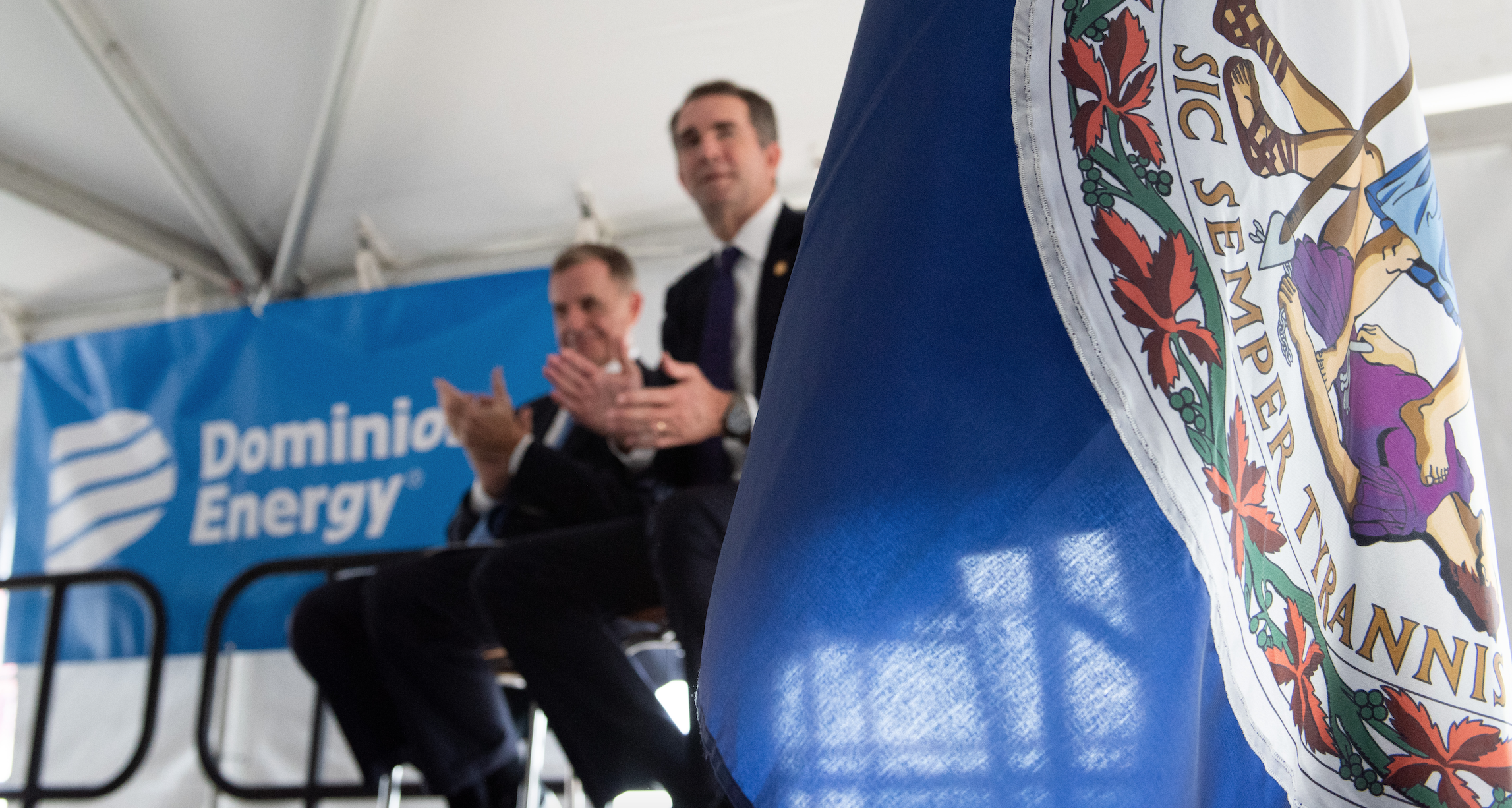
What did Dominion do with that money?
A reporter found that “the new law has been good for company shareholders, who faced a risk of losing 40 to 60 cents per share if the constitutional challenge had prevailed and Dominion’s profit margin were lowered to the levels allowed in most states, according to an analysis by Goldman Sachs Equity Research in June.” At a price of about $87.00 per share, the rate bill adds an extra 0.5% in share price for Wall Street speculators. It’s not about Obama or Trump – or pipelines, or offshore wind, or electric buses – Dominion would deliver pizzas, for all they care, as long as it’s overpriced and the government pays them cost plus to do it.
Secondly, Dominion CEO Tom Farrell built a monument. Dominion’s Richmond skyscraper sat adjacent to a building for which he had “particular dislike,” he said. Richmond’s leading architecture critic wrote that the restorable “concrete and red brick facade is quite striking” and inside, “the original hardwood flooring is intact and spectacular.” But “instead of taking the ecologically savvy path of renewing this historic resource, a building that meets the sidewalk squarely at every turn, speaks to local history, and would provide a special, beautiful and unique work space,” according to the architect, “Dominion is demolishing a solid and desperately needed anchor.”
Tom Farrell had a different view of architecture. He thought it was “the ugliest building in the city of Richmond.” “The building that was there was something I drove by most days,” he explained with characteristic imperiousness in 2016. “I instructed Carter [Reid, Dominion SVP] to find a way to buy it and tear it down, so here we are.” There are worse things in the world than driving by a building one doesn’t like, but Dominion’s new building would cost $300 million, it had plenty of money that it had vacuumed up by screwing ratepayers, “so here we are.”
Third, unlike the anonymous head of the local water utility, Dominion executives fly around in private jets,: their 2013 Gulfstream G280, 2014 Gulfstream G28, and 2017 Gulfstream G450 (tail numbers N603D, N604D, and N607D, respectively). The latter alone costs about $40 million up front and $2.5 million per year to operate.
Fourth, Tom Farrell was the highest-paid utility executive in the United States, while Dominion was the nation’s second-least energy-efficient utility, ranked between Alabama Power and Entergy Louisiana. Virginia should change its marketing slogan from “Virginia Is for Lovers” to “Thank God for Alabama.”
How did this anti-business parasite exist in a state that claims to worship business?
Virginia politics is for sale to the highest bidder. Virginia state politics reflects a system that is not broken, but is working exactly as designed. The Virginia Way catechism has an economic purpose. The most successful pursuit of Virginia landowners has been to maintain their wealth and power by promulgating an all-encompassing ideology that infuses society with unearned reverence for and unquestioned obedience to them.
How can people challenge the state religion? Three successful examples show how.
The Power of Moral Ideas: Activate Virginia and the Dominion Pledge
The idea to ask Virginia politicians to pledge never to take money from Dominion was visionary. Such was the power of Yorktown native Josh Stanfield’s insight and the energy of its messenger that its spread represented the direst challenge to Dominion Energy’s decades-long reign as the state’s legislative hegemon.
Josh Stanfield is modest, and he would be the first to give credit to other leaders for adroitly capitalizing on this and other opportunities. The Activate Virginia pledge tapped into something that many Virginians understood instinctively.
Stanfield had a canny prescience about Virginia’s post-Trump political ecosystem. He theorized that challengers in races against incumbents could garner positive press coverage for refusing money from Dominion, which would fail to recognize the evolving political dynamic and invariably support the incumbent. He reached out to all Democratic challengers for the 2017 House of Delegates races and secured the pledges of an astonishing seventy-six to never take money from Dominion. He hit a nerve. “We’re lucky in Virginia that we have a common villain with Dominion Energy,” he said. “Dominion is trying to build the Atlantic Coast pipeline, so we have a lot of pipeline fighters who hate Dominion for that. They buy out our legislature; a lot of people hate that. They’ve got coal ash all over Virginia; everyone hates that. It was so easy to build a coalition against them.”
The 2017 Democratic wave thrust into office a dozen freshmen delegates who promised to never take money from Dominion. A thirteenth, incumbent Sam Rasoul, had taken the pledge and won reelection. While Dominion from time to time had swatted away upstart challengers from the populist left and right, in 2017, politicians had challenged the Virginia Way and won – an existentially threatening result, if you relied on campaign contributions to secure political fealty.
Dominion is now a wedge issue that has caused a split in the aristocratic class that rules Virginia. “Those who hope for reform could hardly invent a better nemesis than Dominion,” a reporter noted. “Lawmakers, lobbyists and others at the General Assembly say there’s been a noticeable change in attitude toward the company [in 2018] compared to three years ago, when Dominion had little trouble passing legislation that has yielded a significant windfall for the company,” wrote Associated Press reporter Alan Suderman. “‘It was considered suicide to even speak against Dominion,’ said Chap Petersen, a Democrat who added that he recently received a standing ovation at a town hall when he previewed a bill to ban public service corporations like electric utilities from making political contributions. ‘First time in 21 years of public service.’”
The Oligarchs Botch Their Response
The Godfather doesn’t really need the money: it’s the principle of the matter. The Godfather can’t let one shopkeeper get away without paying lest the rest realize they don’t have to.
Dominion really had only one sharp tool in its toolbox, and it was a testament to Stanfield that he perceived how effectively its money could be used as a cudgel against it. Disclosure forms filed in 2018 would show the corporation “spent more than $1 million on lobbyists, entertainment, meals and communications from May 2017 to the end of April 2018. That’s about 10 times what the company said it spent in last year’s filing.”
One of Dominion’s allies in the fight was Appalachian Power Company, also a government-guaranteed monopoly, albeit one with captive customers in southwest Virginia and a much smaller political footprint. The no-contribution pledge applied to ApCo as well as Dominion, and ApCo had made at least $20 million from the 2015 ‘Clean Power Plan’ scheme.
In June 2018, ApCo’s law firm, Hunton Andrews Kurth, announced that it would not give money to lawmakers who refused money from ApCo. It was instructive to see the utility become involved in this way; its service territory was dominated by Republican politicians who had easily survived the blue wave in 2017. Sam Rasoul lived in ApCo’s service territory and refused ApCo’s money on principle, but his district was a Democratic outpost in a sea of red that extended veritably from Richmond to St. Louis.
“Our state government relations practice group feels a high sense of loyalty to all of our clients,” said the law firm’s top lobbyist. “We have represented Appalachian Power for the last 10 years or so, and (works) [sic] with members of the General Assembly on legislation of importance to Appalachian Power as we have for a number of other clients. The unusual step of (lawmakers) automatically refusing to accept contributions from a client has caused us to hold back our contributions to those same legislators.”
The law firm’s brain trust decided that people who had just won elections on anticorruption platforms would publicly abandon their principles at the suggestion that a giant lobbying firm would not give them money. It was foolish groupthink.
The announcement had the predictable result of garnering glowing coverage for campaign finance reform and negative attention to the Virginia Way. “Such pronouncements from a donor to candidates are rarely made public because their rank and odor are worse than that of swamp muck,” editorialized the Daily Press. The Lynchburg News & Advance summarized it well: “They’re evidently scared.” “Anything that diminishes the influence of large corporations over Virginia politics is fine by me,” Delegate Lee Carter said. “If there’s one less lobbying firm giving one less dollar to one less legislator, that’s a step in the right direction,” Stanfield agreed. “From my point of view, it’s almost like a concession.” The oligarchs looked down at a population increasingly out of their control and thought that honest public officials would tremble at the thought that Hunton Andrews Kurth wouldn’t deign to give them a few crumbs from the table.
It turns out people don’t like it when rich frat boys try to bribe politicians. As of February 2020, 20 Delegates, 2 State Senators and 2 members of Congress have taken Activate Virginia’s no-Dominion money pledge, while 40 Delegates and 9 State Senators have taken Clean Virginia’s.
The Power of Moral Symbols: Red Terry and Pipeline Resistance
Other than supporting Activate Virginia and conscientious politicians, how else can Virginians fight back against the plutocrats?
The quintessential example was a sixty-one-year-old grandmother who confounded governors, CEOs, and the federal government when she was charged with trespassing on her own property. The most pressing issue on the minds of those officials in April 2018 was not Theresa “Red” Terry and her family’s cabin at the end of an unpaved road in Bent Mountain, Virginia. But it soon would be.
The 308-mile Mountain Valley Pipeline was not popular among Virginians whose land would be seized, uprooted, and polluted so that private interests could export West Virginian and Pennsylvania fracked gas to India. Adding fuel to the fire was an unusual amendment to the Virginia Constitution that prohibited corporations from using eminent domain to take people’s land for private gain – corporations, that is, except for utilities. The Virginia legislature had been complicit in this land grab, from passing a 2004 law that guaranteed that “gas companies have the power to enter property without permission” – as Bart Hinkle of the Richmond Times-Dispatch wrote, before his modicum of integrity became so threatening that Dominion bought him off with a sinecure so he could be replaced by a more pliant shill – to twice passing the above amendment, as required by the state constitution, before sending it to the voters for final approval in 2012. For opponents, then, stopping the pipeline was no longer a matter of legislation but of justice.
Red’s centuries-old farm had been in her husband’s family since before the Revolutionary War, and she would be a witness to crews despoiling it with chainsaws and bulldozers. Her husband nailed a stand and tarp thirty feet up a tree on their land, and she climbed it with little fanfare in late March 2018. When she began her vigil, nobody seemed to care, and construction crews felled the forest around her. “My daughter is also in a tree and had them on all four sides of her,” Red said. “She cried all day.”
A local radio station covered her plight two weeks later, and on April 17, Blue Virginia published an activist’s video that drew thousands of views from the sort of people who followed politics every day. Red peered out from her stand and told a videographer, “I will come out of the tree when these people get off my land.”
The next day, lawmakers from the area and northern Virginia held a press conference at the state Capitol to condemn the many problems with the pipeline, from contaminated water to eminent domain abuse to the treatment of Red and her daughter. One Nelson County resident said that the cooperation between rural and urban lawmakers was “very important. They have a lot of votes and a lot of swagger behind them that maybe those of us in rural areas don’t have.” Red responded that she was thankful for the attention, but she would prefer it be focused on the pipeline rather than her.
That same day, “a Roanoke County magistrate was signing their arrest warrants for trespassing and obstruction of justice.” The story went viral when reporters and readers heard a mother and her daughter were about to be arrested for “trespassing” on their own property. “They’re not taking my property without a fight,” Red said.
Even more troubling were conflicting reports that they were being denied food and water and that local police told her husband that “he could leave food for his wife at the bottom of the tree, but she would have to come down to get it.” “They’re violating her basic human rights, by not letting her have food or water should she ask for it, or a hot meal should she ask for it,” her husband said. “You put someone in prison you feed ’em. Usually when you get to prison you’ve been tried and convicted. And she has neither been arrested, tried or convicted.” The spotlight swung over to the Roanoke Police Department, and its tactics put its leaders on the defensive. The Washington Post soon picked up the story under the headline “Perched on a Platform High in a Tree, A 61-Year-Old Woman Fights a Gas Pipeline.” The symbolism proved irresistible, and Red was the lead story on that paper’s national website on Sunday, April 22, 2018.
When I visited Red on April 23, 2018, her civil disobedience may have seemed much like she looked to those below: lonely, desperate, and doomed, but also inspiring, courageous, and just. A closer look revealed even more. To scan the crowd of fifty or so surrounding Red was to see how dire the situation was becoming not for the lone prisoner, but for the power brokers in Richmond and Washington who made the decisions that drove her there. There was a group of environmentalists who had at the beginning of the vigil erected a base camp around her. They ran the show, and nobody else would have been there without them. But among the crowd were photographers, civil rights attorneys, and Delegate Rasoul speaking to a television crew. Staffers of Delegate Carter and Senator Petersen were there, and Jennifer Lewis, candidate for Congress and leader of an anti-pipeline group, was moved to tears.
A newcomer to the crowd asked a series of bold questions of the organizers. “Who are you?” one finally asked him. “I’m Henry Howell. Do I need to say anything more?” said Henry Howell III, pugilist lawyer and son of the great politician who had come closest of any populist in the twentieth century to winning the Virginia governorship. In addition to the activists, who could be dismissed by those in power, the presence of the lawyers, media, and politicians personified the structural crisis facing Dominion in the second decade of the twenty-first century. Put simply, it was bad for business to raise electricity rates in order to bury explosive hazards throughout hundreds of miles of public forests and private land. Whereas a few days earlier, the Roanoke Police had been using hunger as a weapon to speed Red Terry’s arrest, that day, officers personally delivered her pizza and sandwiches.
“Appalachian politics are more eclectic than what the national headlines would suggest,” and an even deeper examination fleshed out the nature of the motley group. Professor Rhiannon Leebrick of Wofford College, whose research focused on social change and environmental issues in South Central Appalachia, noted that, the organizers of environmental justice movements in rural Virginia possessed social networks, political sophistication, and economic capital that could be brought to bear on local governments and nongovernmental organizations to influence public policies. The ‘activists’ were smart and well-connected. They had turned a small vigil into an international media scrum within a week.
In a system of government like Virginia’s where the laws were largely written by and for the powerful, lawyers would be key. Red’s civil disobedience, and the efforts of thousands of others who worked in large and small ways to help her without recognition, marshaled the legal activism of those who knew that though the law had once worked for the pipeline, it could now be put into service against it.
“My name is Henry Howell, Bar number 22274. Write that down!” the pugilist later told a National Forest Service officer surveilling him with a telephoto lens, as he escorted Senator Petersen to other pipeline protesters that Petersen would soon file suit to protect. “All these brave, courageous, intrepid tree sitters must be wondering where their Governor and Attorney General are, as the economic powers of interstate, out-of-state pipeline companies are using our government to enforce a federal judge’s order for private companies to profit by taking people’s land,” Howell III wrote, outlining a case for court action.
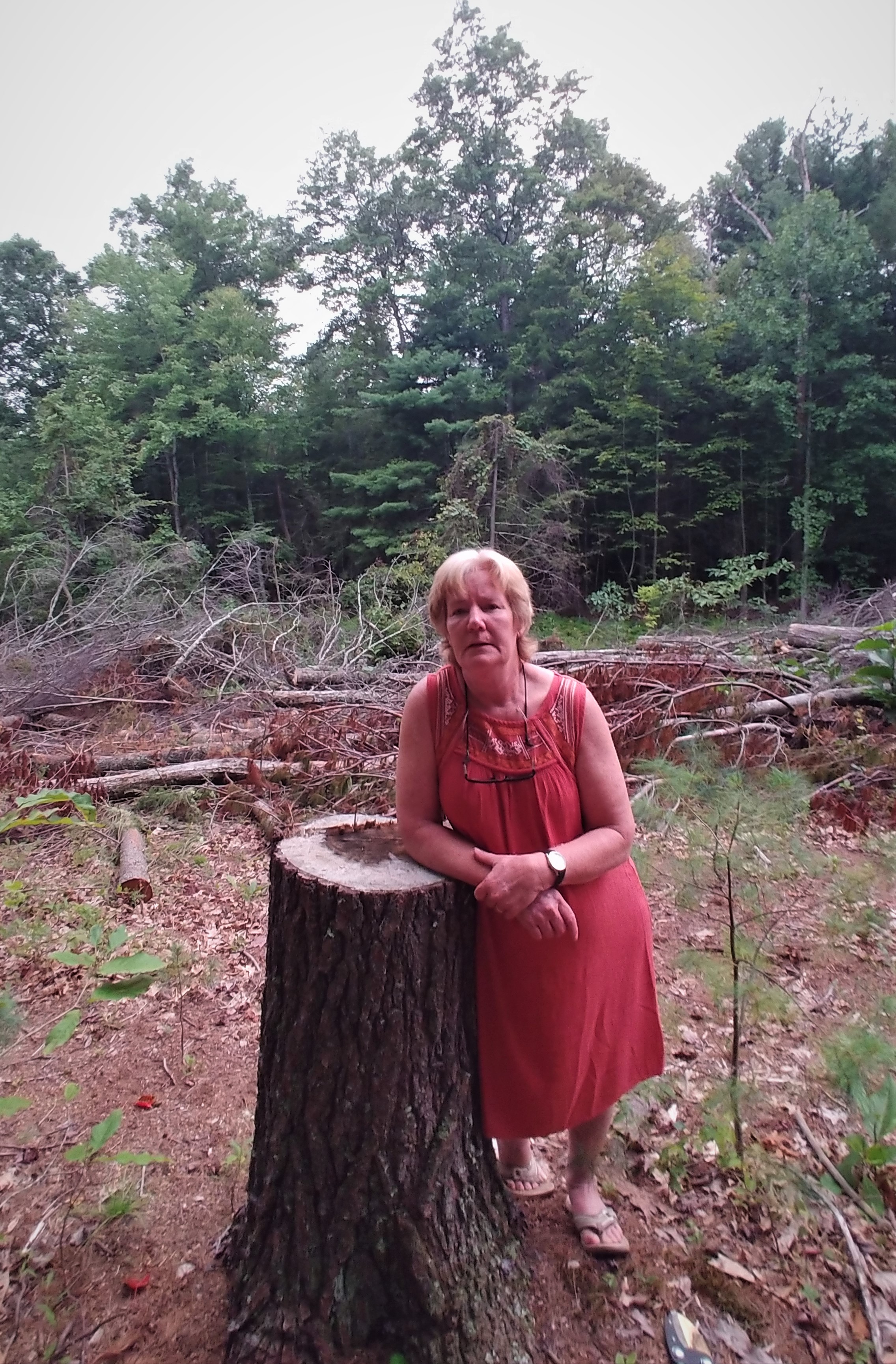
In August 2018, the state capitol’s newspaper of record reported on the fusillade of legal skirmishes that had begun since Red’s last stand.
“In Virginia and West Virginia, Mountain Valley has been put on notice six times since April that its measures to control erosion and sediment were failing, with muddy water sometimes flowing from work zones into nearby streams. Then in late July, a federal appeals court invalidated permits allowing the pipeline to cross through the Jefferson National Forest, faulting the U.S. Forest Service for not pushing for tougher erosion controls…Then, the Federal Energy Regulatory Commission ordered a stop to all work on Aug. 3. The commission also this month ordered work to stop on the Dominion Energy-led Atlantic Coast Pipeline.”
In an extraordinary series of events on December 7, 2018, the Fourth Circuit Court of Appeals issued a stay for Atlantic Coast Pipeline construction; the Virginia State Corporation Commission, for the first time in history, rejected as not in the public interest the Dominion monopoly’s integrated resource plan for future infrastructure; and the people of Virginia (through Attorney General Mark Herring) sued Mountain Valley Pipeline alleging more than three hundred environmental pollution violations. Reflecting a heretofore unimagined political reality, Herring also chose that day to announce that he would seek the governorship in 2021. Days later, he pledged that he would never again accept any money from Dominion or its executives.
All of this has impacted the bottom line of Dominion the ‘private company,’ which is why they need their perpetual bailout machine of the deliberately inefficient and corrupt Virginia utility. The pipeline battles are not over, but the battlefield has shifted and honest people are winning again and again in the courts, including an extraordinary victory against the pipeline’s racist Union Hill compressor station in January 2020. As of February 2020, “the cost of the Atlantic Coast Pipeline project has now risen more than $1 billion since it was originally announced in 2013.” Dominion is desperately appealing a recent ruling to the Supreme Court, where toady Attorney General William Barr, a member of Dominion’s Board of Directors until February 2019, might conceivably have some influence in the Court’s February 24 hearing on the matter. Attorney General Herring filed an amicus arguing, correctly, that the pipeline is not even needed.
Red came down after thirty-five long days, but the truth was, she and all the people who understood the power of her symbolism launched a winning war.
The Power of Moral Communities: Richmond for All and the Dominion Coliseum
Dominion’s hubris has also put it under siege in its hometown, where a $1.5 billion pet project of the monument man was halted in no small measure by an outstanding group of people working together with no money.
Richmond has an engaged but diffuse activist scene comprising many different issues and factions, and there are some problems with racial division even today. In a city of 220,000, of whom maybe 1,000 or so up to and including the Mayor are engaged in daily political life, a group of organized members can make a significant difference. It is hard to change the world completely alone, so Virginians should be thankful that Dominion’s greed created a democratic organization that helped wage a winning campaign against Dominion in its own backyard.
Public school teacher Emma Clark became involved in Richmond politics because of a series of issues she experienced at Richmond Public Schools. Her political worldview and advocacy were catalyzed by the systemic critiques and questions being offered by Bernie Sanders during his 2016 presidential campaign. While campaigning for Richmond School Board member Kenya Gibson (3rd) in 2016, Clark met 7th District School Board candidate Gary Broderick and his partner, VCU associate professor Kristin Reed. But electing candidates every four years is not all a political organization can be.
In the summer of 2017, Dominion CEO Tom Farrell teamed with Richmond Mayor Levar Stoney to try to push a $300 million bond issue ($600 million with interest) through Richmond City Council in order to bulldoze the Richmond Coliseum and build another one. Their master plan also included residences, retail, office space and a hotel. Suffice it to say that the Dominion arena project has been exposed as a corrupt and deceitful process that Esson Miller, a careful attorney and former director of the Virginia General Assembly Legislative Services Division, compared to a “nightmare.” This is not something that people like him typically write. But it was not always recognized as such when it was announced.

Richmonders had firmly expressed their opinion on local government in a 2017 referendum that received 85% of the vote – led by the brilliant and principled strategist Paul Goldman – that the city’s top priority should be to fix Richmond’s dilapidated schools. The dichotomy between Richmond Public Schools’ $600 million in capital needs and the Dominion arena’s $600 million giveaway to corrupt private interests was clear. More than any Confederate shrines, Richmond’s school facilities were the city’s living monuments to segregation.
“The Coliseum was perfect for showing what Richmond for All could be,” Emma Clark says. Clark is just one of many brought together by hatred of Dominion. Everybody justifiably despised the Dominion arena plan: liberals and progressives who cared about public schools and corruption; conservatives and Tea Partiers concerned with government waste and eminent domain abuse; environmentalists; politicians; teachers; and racial justice, transit, smart growth, housing and good government advocates. Prominent establishment figures cold called me to tell me off the record what an embarrassment this project is. The only people who don’t hate the Dominion arena are on its payroll.
This is on top of the people who already resent Dominion. Whitney Whiting is a local video editor who has lived in Richmond for nearly twenty years. “I trace my activism against Dominion to the Shockoe Bottom stadium fight. Those of us in the no ACP [Atlantic Coast Pipeline] fight started to pay attention to Dominion in the City of Richmond because of Shockoe Stadium,” a similar boondoggle that would have put a baseball stadium on Richmond’s historic enslaved persons burial grounds. “Obviously when we talk about Dominion, it’s not unrelated to white supremacy at all,” she said. “To me all of these things are connected: the Coliseum, the Shockoe stadium, the pipeline, the whole done deal narrative that they’re trying to push on people.”
“I got involved with Richmond for All through [famed Richmond organizer] Lillie Estes before she passed last year. She said, “You have to meet my girl Kristin” Reed. I was organizing around Union Hill and Navy Hill [Richmond Coliseum] around that time because of the Coliseum touching so many issues people were working on.”
The difficult and all-consuming activism many of Richmond for All’s members engage in can lead to high rates of burnout. But being in the maelstrom with others who empathize with your sacrifice can help people strategize, recuperate, and regroup. “Being a Richmond For All member has provided a much-needed infrastructure for the balance of collective celebration, grief, and solidarity when taking on a multimillion-dollar corporate buy-out of our city,” Chelsea Higgs Wise notes.
The foundational elements of Richmond for All are trust and shared moral values. “Showing up for each other is one of the things that build trust,” says Whiting. “Trust in organizing is not a one-time thing – it’s something that continues over time, and people have to be allowed to make mistakes and to learn from those mistakes, and that takes time, as well. This campaign against the Coliseum has provided pathways for people to build these relationships with each other.”
In management guru Patrick Lencioni’s model, trust is the foundation for true teamwork. People who trust each other are able to disclose their vulnerabilities with the knowledge that their team has their best interest at heart. All issues are put on the table and discussed forthrightly, after which a decision is made that is in accord with the team’s values. Team members operating from positions of trust and vulnerability are grateful for constructive criticism. It is difficult to achieve, but, in this way, teams should be much like families where each person profoundly cares about the other.
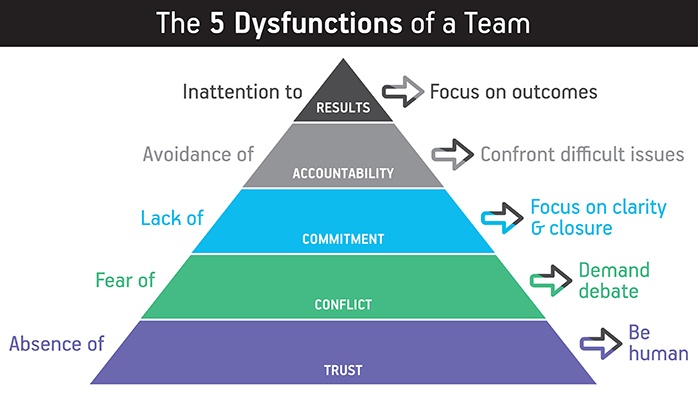
To pick an example, I witnessed one conversation where a bright and well-qualified member told another about his/her plans to run for office. The other member told the first that s/he would not win and laid out the reasons why. They had a candid, non-judgmental conversation about the merits of this highly personal decision. This reasoning changed the mind of the potential candidate, and then they accepted the wisdom of this and moved on without any need to apologize or endlessly examine. It is difficult to tell somebody they are wrong, but that is what true friends do for each other when the time is right.
In this they are different from Dominion, which incessantly spreads propaganda throughout the population. When the barrier to dishonesty is crossed, it soon morphs into a lesser sin that can justify the means. Those who deceive and manipulate outsiders find themselves turning those tools against unfavored team members. Moreover, it is not possible to trust people who lie all the time. The result is that the leaders of the Dominion Coliseum “nightmare” were a self-selected group not highly qualified for their work but willing to sell their souls to do it.
There is another important contrast: unlike Dominion, Richmond for All is fully integrated along lines of race, gender and sexuality. Racism is one of Richmond’s founding tragedies, which was spread by the plantation owners to keep working people divided. The deep work of understanding white privilege, patriarchy, and other forms of oppression can be hard and even hurtful. Charles Dew movingly examined his own Virginia upbringing in The Making of a Racist. “My training as a Confederate youth had pretty much been completed when I was in my early teens,” he lamented. “Everything I had learned growing up pointed in exactly the same direction.…[A]nyone who thought otherwise was either an arrogant, or ignorant, Yankee or certifiably insane.” We know that learning is natural when we are young—indeed, children cannot not learn—and requires more effort as the years go by. “I could have stopped at this point and remained warm and content in a cocoon,” Dew wrote. It takes work for people to unlearn what they were taught as children, but it is by no means impossible.
People who come from positions of trust accept each other for who they are as imperfect beings. Those who have been raised in Richmond’s milieu can sometimes inadvertently say or do something inappropriate – in fact, it would be surprising if that weren’t the case. The diversity of Richmond for All is natural, for those who have excised racism from their hearts do not see other people as others but as people; then, the external work of fighting racism can be more effective. “There’s been a lot of growing pains over the years with identity politics issues and a lot of moments in the last few years,” says Whitney Whiting. “I myself have learned how important it is to show up for people who don’t look like me and who have a different experience of oppression than I have.”
In their integration they avoid the token racism and sexism of the Dominion urban renewal plan and its backers who disgracefully paid off a number of black Richmonders and put men and then women of color as its public faces. From the project’s inception in mid-2017 until late 2018, Dominion pitched a conventional corporate newspeak case of how the project would provide economic development and jobs. The premise of this was that the vibrant majority-minority community in the Coliseum area was basically a dangerous wasteland where “folks” could not walk.
Dominion’s older office tower downtown looks as if it was designed to protect itself against riots. It’s hard to comprehend the mentality that would build this fortress, but easy to understand how that mentality would lead someone to long to bulldoze and gentrify the entire “urban wasteland” of un-people between Altria’s Richmond headquarters and the white areas of town.
The savvy members of Richmond for All recognize their comparative advantages. The organization is led meritocratically, meaning it is mostly led by a gifted group of perspicacious women of all races. Broderick, wunderkind Allan-Charles Chipman and housing pro Omari al-Qadaffi also deserve mention (among several others whom I haven’t spoken with).
The practical effect of having a broad organization of talented experts working hard together all the time is that nobody can show up to every event, but Richmond for All can. For one example, the journalists covering the Coliseum scam were at the local print media outlets, but Kristin Reed’s tweets provided invaluable microjournalism coverage of the innumerable public meeting arcana that could not fit into 1,000-word articles. This is something that anybody can do: Kristin Reed just got up early to do it.
Furthermore, the small or large, individual or collective actions that the members can engage in are informed by what amounts to a political intelligence network that is becoming increasingly linked with the new wave of politicians at the state and local level. We can all understand how politicians are people, that most people are nice, and that all of us, including politicians who must face voters, want to find a way to get to yes. Showing up makes a big difference in state and local public policy. The best-funded presidential campaign in America (other than the billionaires’) is Bernie Sanders’; it currently has six paid staffers in Virginia in advance of Super Tuesday. During campaign season this fall, a hundred or more members of Richmond for All will turn out the vote for local elections.
Dominion Loses Big in Its Hometown
Dominion’s greed and hubris have blinded it to what is really happening. As an immoral corporation, Dominion is incapable of comprehending those who truly believe in human equality. Dominion only has money at its disposal, and the people fighting Dominion can never be bought.
To try to pass the Coliseum scam through City Council, Dominion and its allies set up a fake 501(c)(3) charity, NH District Corporation, as the lead developer. “The first thing I did was visit Richmond and go to all of their addresses, and, lo and behold, they didn’t exist there,” says Josh Stanfield. Their tax return documents indicated that Dominion had sold itself the arena naming rights for more than $20 million. Furthermore, there were only two donors to this sham charity: Dominion and Atlantic Union Bank (Ukrop’s supermarket’s progeny).
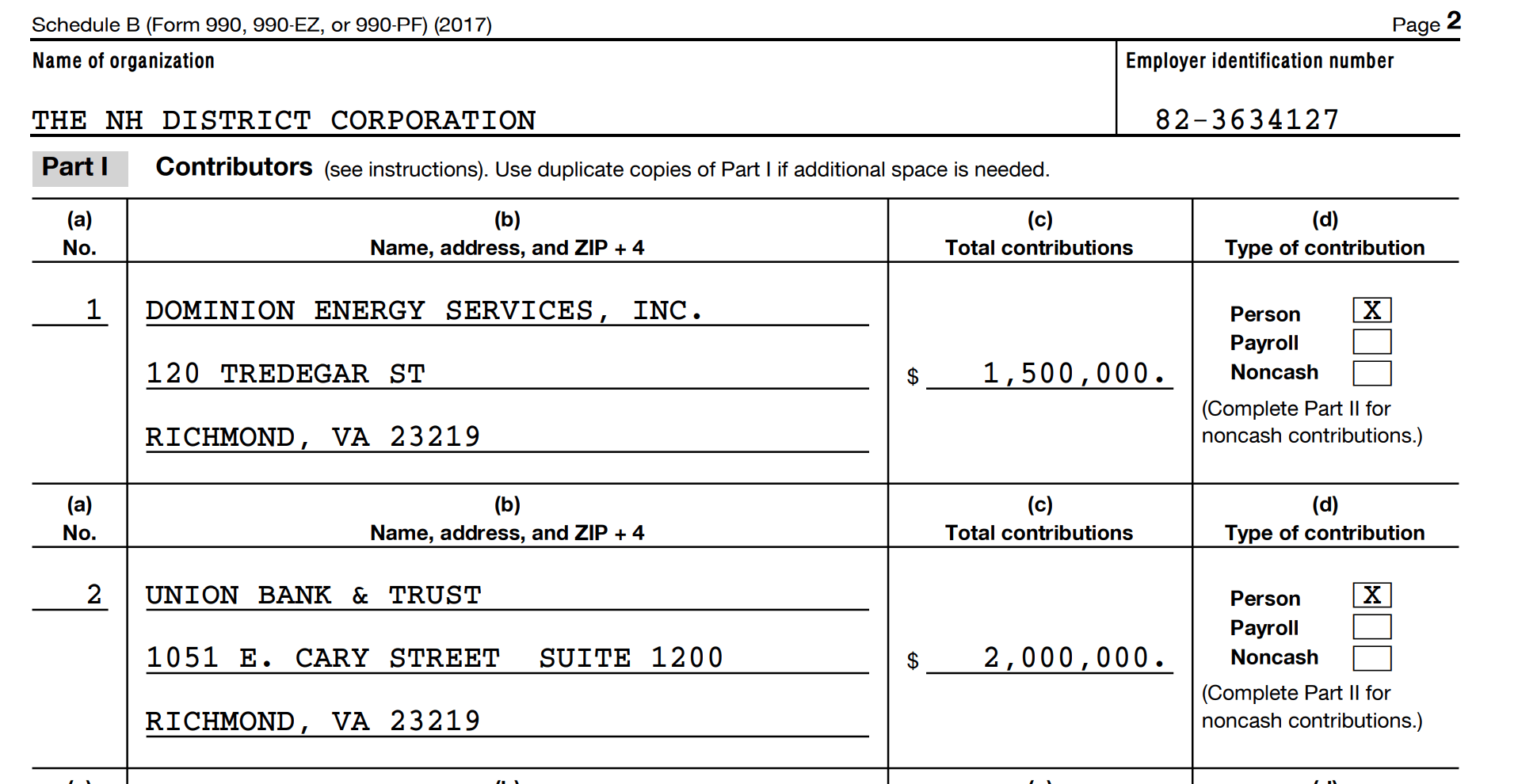
When these documents were released, spokespuppet Jeff Kelley released a statement in the fake charity’s ‘defense’ openly admitting it was a sham charity: “The contributions from Dominion Energy and Atlantic Union Bank listed on Navy Hill’s Form 990 are not ‘gifts’ but rather advances on payment for future potential marketing opportunities.”
There were a number of other troubling issues. NH was the sole entity that responded to the City’s RFP in 2018, and in a modern-day blackface scandal, its white spokesperson was caught ghostwriting columns for prominent Richmonders of color. Most damningly, an independent City Council report in December 2019 concluded that “a majority of commissioners did not find the proposed, publicly financed $300 million arena a sound and reasonable public investment in the redevelopment of downtown.”
When a majority of Richmond City Council moved to kill the Coliseum scheme on January 27, 2020, the fake nonprofit released an unhinged projection berating Councilmembers and warning that a failure to ratify Dominion’s unpopular scam “could discredit the City of Richmond’s business reputation for years to come.” “Today is a true demonstration that democracy is possible in Richmond,” said Chelsea Higgs Wise, a Richmond for All member and one of the city’s most charismatic and beloved citizens.
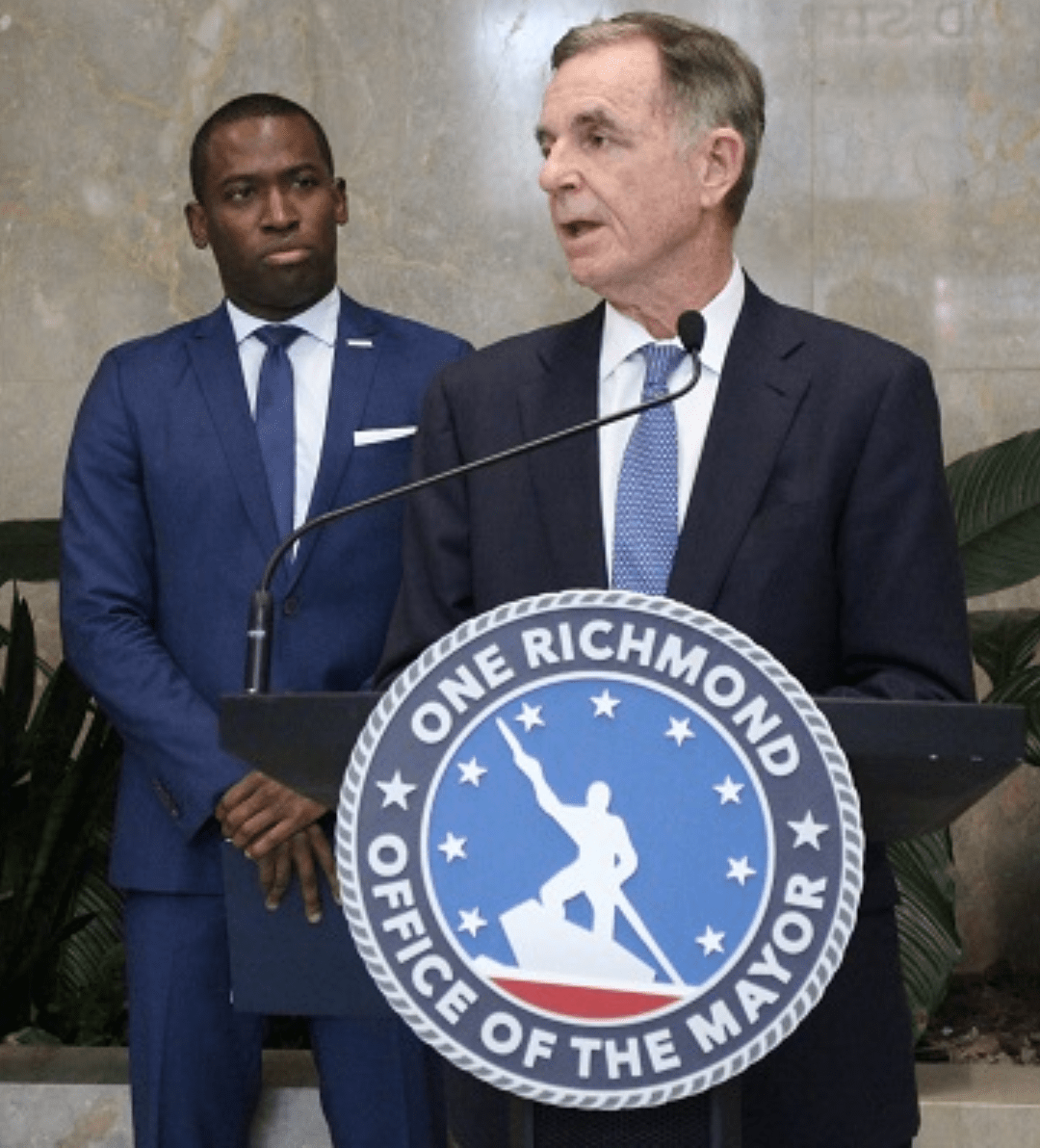
Mayor Stoney tweeted that he would not kill the bill and, “refusing to believe that the massive plan is being rejected, the mayor used his third State of the City address Tuesday night to defend the proposal.” Councilman Chris Hilbert, a potential swing vote, told a reporter, “How dare he?” then said that he was “for sure” voting against the arena proposal. Councilwoman Kristin Larson “looked like the blood was going to boil out of her head” when she was informed of Stoney’s position. “She said there was nothing Stoney/the developers could announce between now and the scheduled final vote that would change her mind,” reporter Mark Robinson tweeted. Another potential swing vote, Reva Trammell, said “I will never vote for this project. Never.”
In the face of this principled opposition, the supposed ‘charity’ tweeted from: “This is actually how it started @ChelseaWiseRVA: with a community discussion facilitated by YOU” and linked to a purported community forum that Chelsea Higgs Wise facilitated on December 12, 2018 to hear feedback on how to improve the Coliseum scam – feedback that was ignored, of course. Apparently her skills extended to time travel, as the RFP was put out in 2017 and the Coliseum clown car was the sole respondent in February 2018.
Richmonders really don’t like dishonest people. It’s not often you see people with money failing to get what they want in Virginia. But in a triumph of democracy over oligarchy, Tom Farrell’s gigantic money grab was killed by City Council.
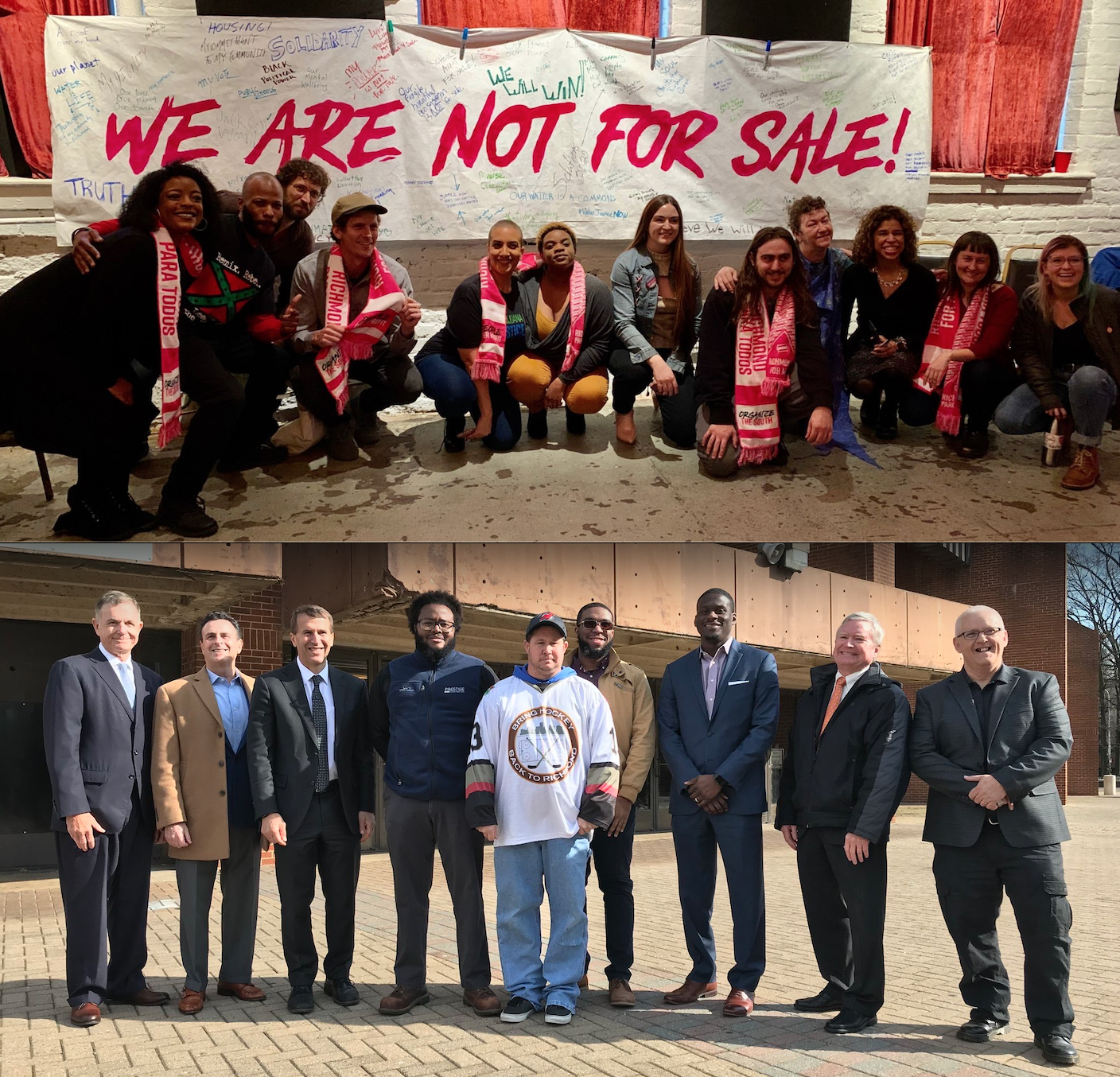
Whatever promises Dominion made to the supporters of the Coliseum plan could not be kept because politicians not subject to bribery understand that Dominion is untrustworthy. Dominion cannot co-opt politicians who are not for sale.
If you live in Richmond, you should join Richmond for all – if not, you should give them a hundred bucks – or more, if you can afford it.
Though there is a long way to go, thanks to Dominion’s overreach, Richmond for All has become a training ground for future political leaders of the city. “Richmond for All makes me feel really excited about the work I see in front of us and about the relationships that are forming,” says Whitney Whiting. “It makes me excited to think about what we can do in the future.” “It was so encouraging to talk to these politicians because you felt like you were talking to a human being,” said Emma Clark. “It just feels really hopeful.”
The Dominion Vampire Goes Hunting
Facing the crisis of democracy, there was another trick up Dominion’s sleeve: appeal to a forum that is not democratic.
The opening day of the 2020 General Assembly session was a historic day that should have belonged to the people of Virginia. Delegate Jeffrey Bourne used it to carry legislation written to bail out the most corrupt and loathsome company in Virginia and its Republican CEO. Essentially, the Bourne bill, HB 1345, would have take tens of millions of dollars from the state general fund to pay for Richmond’s Dominion arena.
Dominion’s Coliseum public relations push had a long and ignominious history of putting African Americans in front of a project while white businessmen remain in control. Governor Wilder wrote that the $300 million in ‘guaranteed’ minority contracts were illegal, and people of color advocating for the project are like “the ‘Judas Goat’ [who] was trained to lead sheep to the pens for slaughter.”
Jeffrey Bourne is a backbencher who represents one of the most Democratic districts in America. His district is 86.7% Democratic, or about 25 points more Democratic than Massachusetts. No Democrat or Republican cared to run against him in 2019, and he won his election against Libertarian Gary Wells with 88% of the vote.
Something curious happened on the way to his unopposed cakewalk. Dominion started to have serious trouble passing its Coliseum scam, and Dominion gave Bourne’s campaign $21,000 cash, $19,000 of it in October 2019.
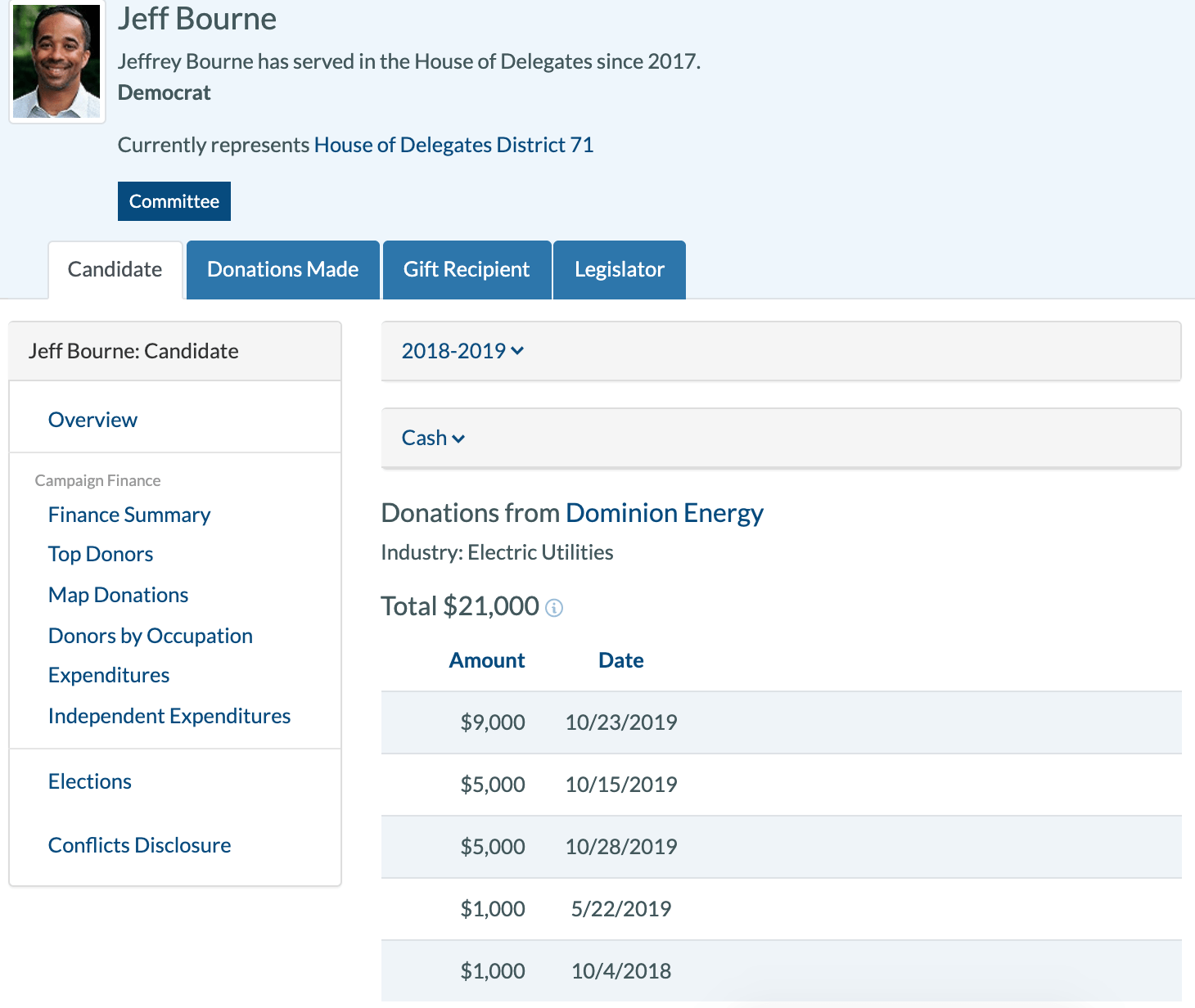
A source close to Bourne said that Mayor Stoney came to him just before session began and asked him to carry the Dominion bailout bill. A local bill submitted to the General Assembly will typically have gotten approval from the region’s local and state government leaders. Bourne initially said he would co-sponsor if Stoney could find him other co-sponsors, but Stoney came back to him a couple days later and said that he couldn’t find any. Not a single Richmond official who was contacted was willing to join Jeffrey Bourne and co-sponsor this Bailout Bill, but Bourne introduced it anyways. Jeremy Lazarus of the Richmond Free Press, whose articles are required reading for anybody seeking to understand the Coliseum scam, confirmed what was clear from the beginning, despite Bourne’s pleas. It was not precisely a Stoney bill, as “Farrell was involved in proposing the language for the bill.”
When Roberto Roldan of Virginia Public Media asked Jeffrey Bourne what he thought of the Coliseum project, “Bourne said that he has not fully vetted the Navy Hill project and that his bill should not be construed as support.” This is accurate. If you just do whatever your donors want, then you don’t have to think. The best kind of Virginia Way politicians are lazy and corrupt.
The bill was scheduled for a 5:00 hearing on January 30, 2020 in the Charters subcommittee of the House Counties, Cities and Towns Committee. Lobbyists from Dominion’s transactional law firm, McGuireWoods, lobbied Delegates for the Bailout Bill with imperious emails of the type a boss would send a subordinate. All five of the Democrats on the panel had refused donations from Dominion. Two hours before the vote, Bourne announced that he would pull the bill.
Bourne looked like he was walking to the gallows when he walked into the subcommittee room to present ‘his’ bill to the committee. He told the committee that Mayor Stoney had asked him to introduce it, but that, in light of City Council’s rejection of the Coliseum scam four days prior, he would be pulling the bill so people could have “more conversations.” Delegate Danica Roem, an efficient chairwoman, asked who in the room was going to speak in opposition to the bill, and much of the room stood; she then asked who was going to speak in support, and not a single person stood up in support of a Dominion bill. The committee voted 6-0 to kill it at the request of its only patron. The Dominion vampire went hunting that night and the next day, an illegal ‘emergency’ hearing of the full committee briefly brought the sponsorless bill back to life, but it was soon killed by a 10-0 vote in a Finance subcommittee, again, in the light of day at the request of Jeff Bourne.
Governor Wilder had an incisive take on Bourne’s embarrassing sellout.
“In the days of segregation, characterized by an absence of elected officials for people of color, certain individuals were designated by whites as representatives of the minority communities. They were told what to say and what to do, requiring no need to seek input from the people that they purportedly represented. Questions have arisen and I have been asked if this is what happened in the aforementioned news piece. It’s hard to believe, but not surprising, that in 2020 this has been revived on such a grand scale with only the changing of the name.”
The Political Threat of Refunds and the Crisis of Democracy
The Virginia Way oligarchs did not see the visionaries profiled in this story coming: in many ways, they did not see them at all because they do not look like McGuireWoods partners and therefore they are un-people. To them, Red Terry was an un-person who did not matter, Josh Stanfield was an un-person not to be taken seriously. In Dominion’s attempted Richmond Coliseum scam, the entire premise of the project was that a large area of downtown was some variation of an urban wasteland, when, in reality, it is the most accessible and integrated area of the city, and the people who work and travel there are mostly a different skin color than the mummified wasps at the segregated Country Club of Virginia. The people achieving real progress against Dominion and the Virginia Way are smarter than the insecure Confederates who defend it because the visionaries had to work for their position and rise or fall meritocratically based on the strength of their ideas, execution, and work ethic.
Most Virginians despise Dominion, and with good reason: Dominion is the most contemptible corporation in Virginia. Dominion needs to make money, and the people are truly threatening Dominion’s bottom line, but Dominion is too corrupt and inept to understand how to fight democracy. Dominion does it for money and therefore lacks the motive and creativity to win against the organizers whose lives depend on it.
The ultimate nightmare for Dominion is that politicians will come to understand that artificially inflating electricity rates while maintaining abysmally low energy efficiency in order to send Virginians’ money to Wall Street is bad for Virginia. Lower electricity rates and even mediocre efficiency would instantly put more money in the hands of every person and organization in Virginia – schools, churches, charities, voters, businesses, everybody. When one understands the Virginia Way, and Dominion as the head of the snake, you begin to see how terrifying it is to Dominion that people and the politicians they elect are refusing to submit to Dominion’s injustice. “How many times as a politician can you get a check to every single constituent?” Stanfield asked.
Democracy is a threat to Dominion, but not on principle. The true threat Dominion faces from democracy is rate refunds.
Lessons Learned: How Should You Fight Dominion?
The Virginia Way is a mountain that people have to knock down using whatever toothpick or bulldozer you can. Sometimes, you can chip away, sometimes, you create an avalanche.
One clue how to fight is to understand the Virginia Way and do exactly the opposite. Look to Red Terry and the anti-pipeline movement; Josh Stanfield and Activate Virginia; and Richmond for All’s coalition. They are sophisticated strategists who understand and continually reassess the nature of political power in their communities. They do not have or need financial power, because fighting Dominion on the money front is a losing battle.
These people understand the Virginia Way, and they did the opposite. If the Virginia Way is about oligarchy, they focused on poverty. If the Virginia Way is autocratic, they were democratic. If the Virginia Way is about isolating people and making them docile, they brought people together to fight the plantation owners. Working in like-minded Facebook groups and bouncing ideas around in a circle was not enough: the people in these stories made the people in power pay attention and pay.
Red Terry, Activate Virginia, Richmond for All are important, but they only succeeded because they tapped into our deeply held values. Through ideas, symbols, and organizing, they channeled what is usually unsaid but what Virginians can feel is morally right. These three stories are personifications of popular movements supported by thousands of people working hard all the time.
In 2015, Dominion spokesman David Botkins “could not name a piece of legislation in the past five years in which Dominion did not get what it wanted from the General Assembly.” In 2020, Dominion could not get its arena bailout bill a single vote in a subcommittee.
Virginians are supposed to think and act as if they cannot challenge inequality, oppression, Saint Jefferson, and all the other golden calves – or else.
Or else what?
There is no ultimate threat.
“Tom Farrell’s power is illusory,” Josh Stanfield says. “If he can’t get this done in his own city, why do people act like he’s some sort of all-powerful deity?”
The purpose of the Virginia Way is to indoctrinate the population not to challenge the oligarchs. The Virginia Way creates a mental prison that causes free people to think the freedom they intrinsically feel as humans is wrong. “I think there are moments when we’re afraid, but I think there are moments where we create fear for ourselves that actually just isn’t there,” Richmond for All co-founder Jasmine Leeward says.
The people in these stories are living, working, thinking, and doing right now. They are young and old, female and male, gay and straight, alone and together, every skin color, religion and education level, suburban, urban, and rural – they represent all of Virginia. The only thing these ordinary Virginians did to become extraordinary is take the action they knew needed to be taken but that nobody else was taking.
“We can be free enough and brave enough to just stand in our own personal values, rather than the Southern establishment telling us what’s gonna be best for us,” concludes Chelsea Higgs Wise.
She’s right.
The people of Virginia are not the hired help for Dominion Energy.
***
Jeff Thomas is the author of The Virginia Way, from which part of this article was adapted.


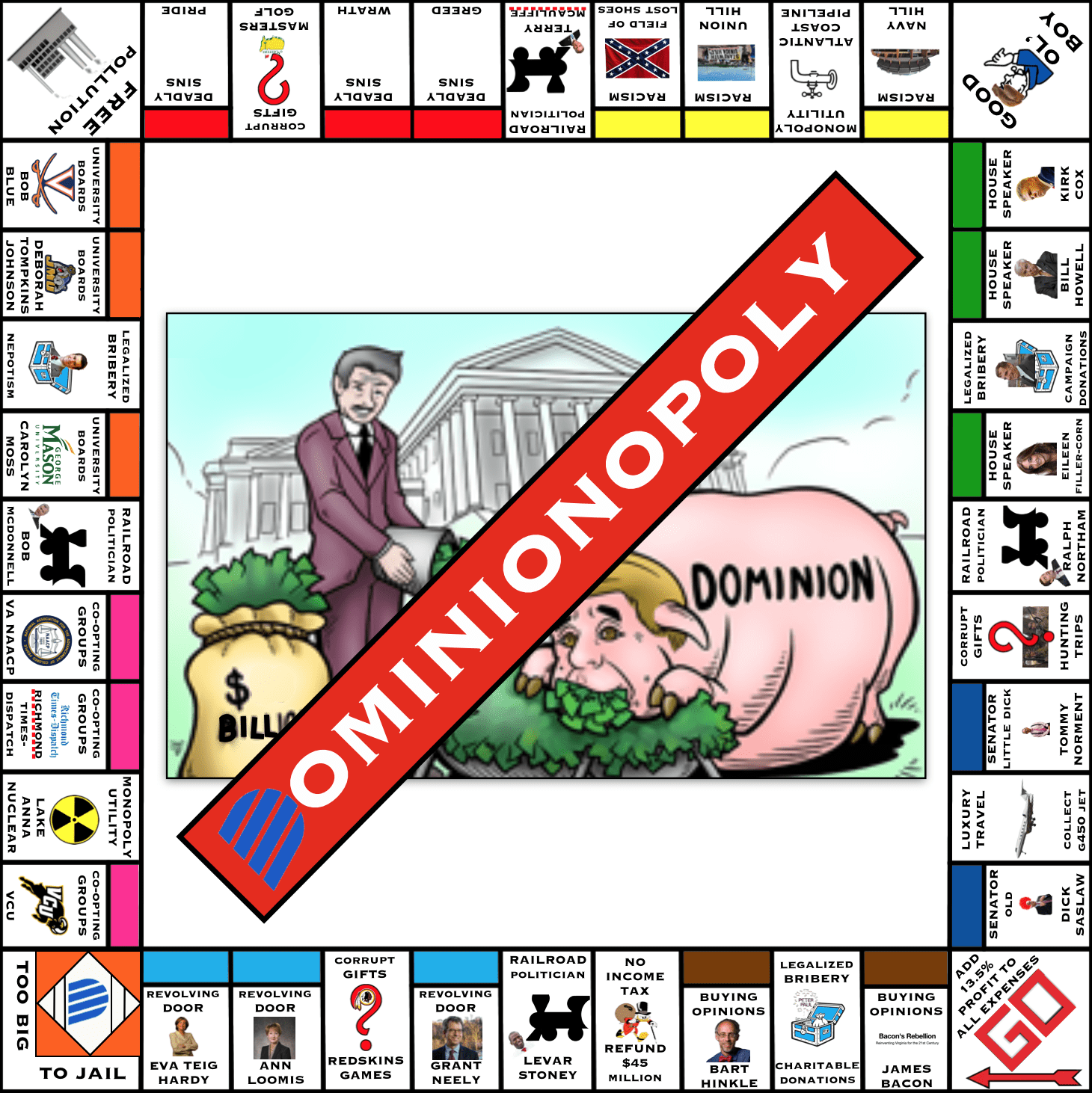
![Video: Ivy Main Says “the hostility to offshore wind is really just [Trump]; nobody else feels this way…he will be gone and then we will get back on track”](https://bluevirginia.us/wp-content/uploads/2026/02/axiosivymain-238x178.jpg)
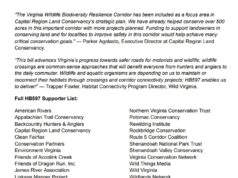







![Video: Ivy Main Says “the hostility to offshore wind is really just [Trump]; nobody else feels this way…he will be gone and then we will get back on track”](https://bluevirginia.us/wp-content/uploads/2026/02/axiosivymain-100x75.jpg)
